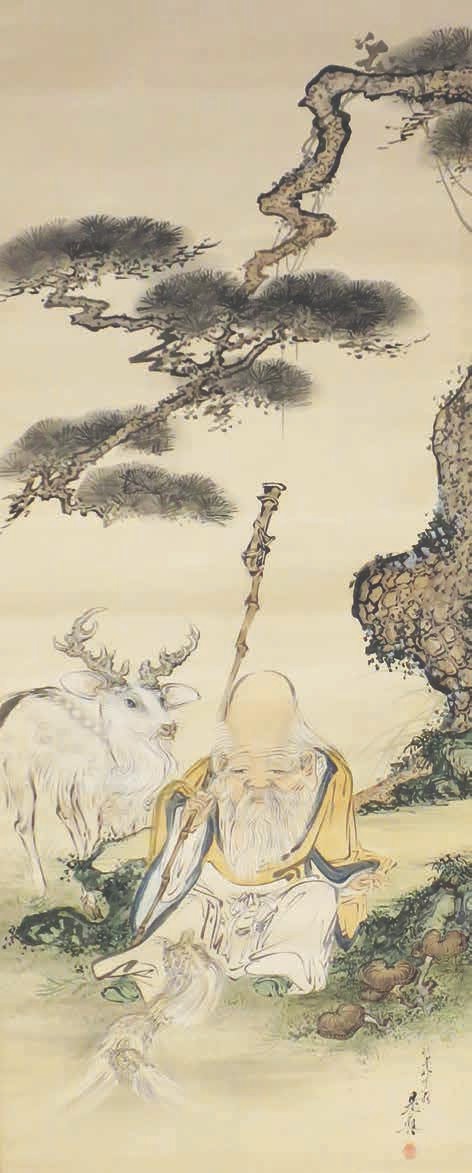
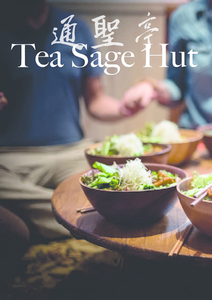 |
|
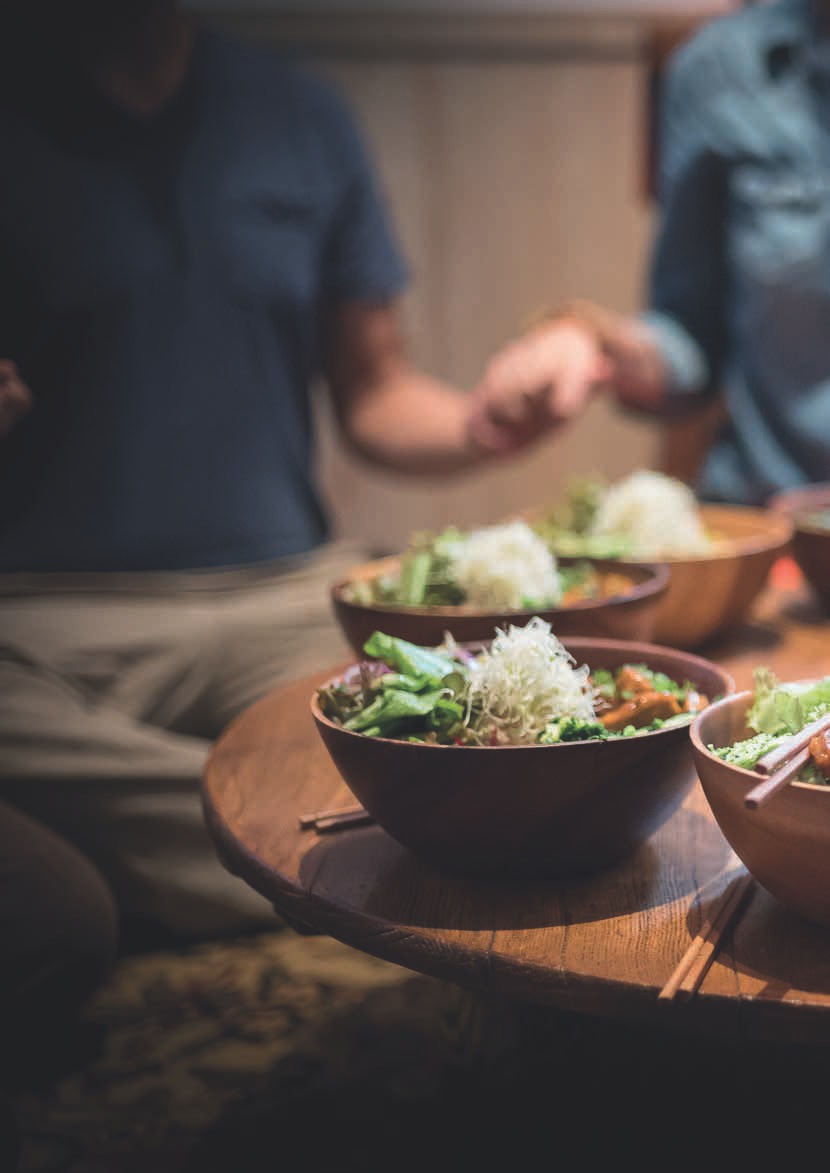
There is more to the old saying that we are we what we eat than just the obvious fact that what we consume determines our physical constitution. Especially in the modern age, diet is as much a philosophy, a way of life, as it is sustenance. Throughout history, our ancestors ate what was available to them, without as much selection as we have. In an age of abundance, we spend a lot of time and energy deciding on a diet, which affects our orientation to life. We can focus on the flavors, the health benefits or even a spiritual philosophy, which we use to navigate our food choices. Along with the copiousness of food choices, there is also a wealth of information on what is and is not healthy - an overwhelming barrage of often-contradictory data, such as studies endorsed by food producers and other agendas. This can be frustrating and affect our health. But there is a compass that can help steer us into our optimal physical well-being.
Because diet has become such an important aspect of our personal identities and philosophies, rather than the simplicity of eating whatever is local to us, the topic of diet itself is rather controversial. People nowadays have strong views about what to eat and when. And we all have different needs based on our lifestyle and makeup. This means that one can only share one's experience in the hopes that some of one's wisdom will be valuable to others. Perhaps some portion of my experience in developing a healthy diet for myself will also be useful to you, though probably not all of what I have to say. I will try to keep this discussing focused on very general principles in the hopes that sharing will be helpful to more of you, my beloved tea community. Of course, all of what I am sharing here is my own experience and should therefore be taken as such. I am not a physician of any kind. We all must take responsibility for our own bodies, health and happiness.
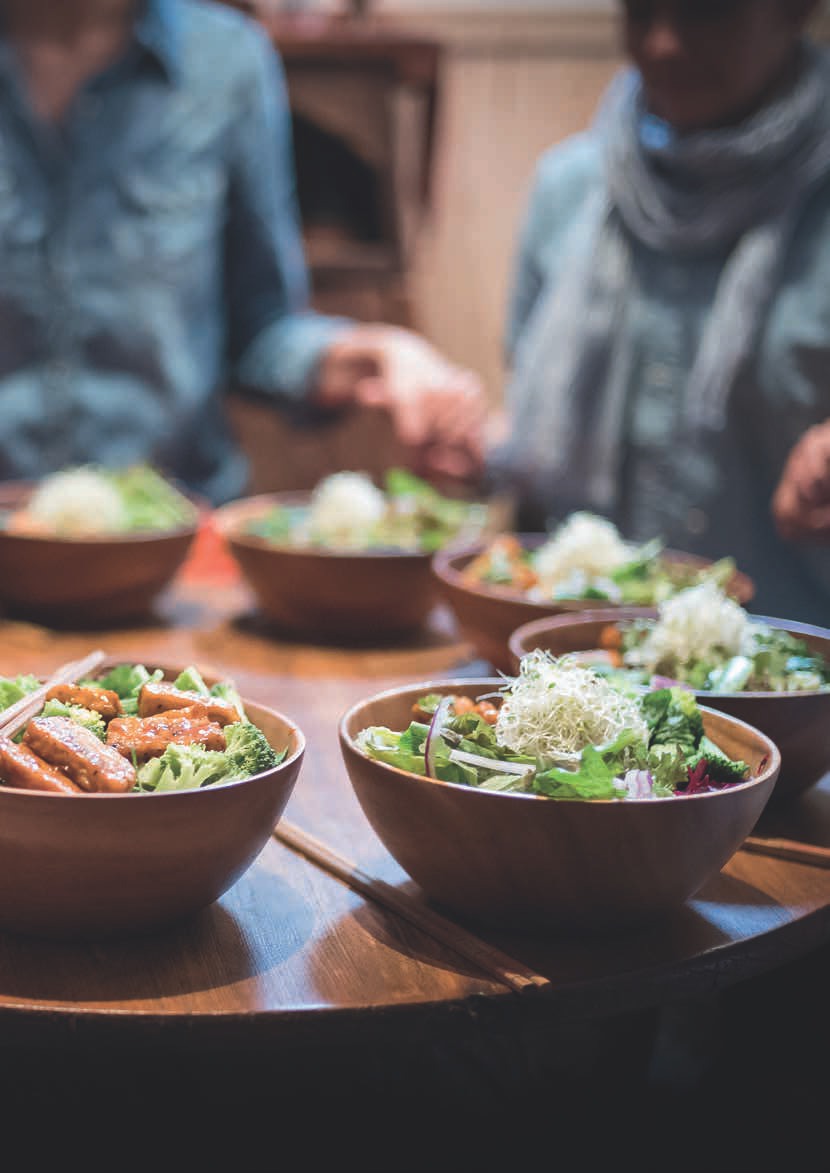
As this is a tea magazine, I will also focus on the areas of diet that I feel have been directly impacted by my tea practice. I think the problems with the world of food are very analogous to tea: both worlds are full of misinformation and tea and food also require further research. Tea and diet are furthermore often studied with a commercial agenda, and one finds that studies are published to promote a certain agenda, like "green tea is anti-cancerous" or "dairy is good for you," and the published research is paid for by businessmen who approach scientists with a conclusion they want proven. Perhaps green tea is anti-cancerous, but true science always starts with a hypothesis, not a conclusion. Such studies are always suspect. But Tea has taught me some things about diet, and many of the methods I cultivated in learning to evaluate tea also apply to food. For example, I find that the Ten Qualities of a Fine Tea, which we often discuss in this magazine, can be very helpful for evaluating the quality of food as well. Here are some of the things Tea has taught me about life and diet.
Since so much of the tea world is marketing, we need to have a method for evaluating tea independent of the story that surrounds any given tea. Stories about a tea - where it came from, how old the trees were or who processed it - these stories are wonderful when shared amongst friends, but not so great when they are used to market a tea. I guarantee that your favorite tea has a story. Maybe you found it in a special shop or got it from a friendly source. And sharing such a story with friends over tea enhances the experience. Telling tea stories, old and new, over a cup of fine tea is something every Chajin enjoys. However, we can all grow jaded by vendors using such stories to sell tea. For that reason, we have to learn to use our own experience to evaluate a tea for purchase. "The truth is in the cup," as my teacher always says. And a sensitivity to one's own body through a tea and meditation practice has also helped me more than anything else to cultivate a healthy diet.
Our bodies are marvelous instruments of experience and wisdom. One of the most important aspects of a tea practice is that it opens the dialogue of nonverbal communication again. And opening that book is an opportunity to read the greatest and deepest book ever written, for no matter how wise the teachings of humankind (even the Buddha), they do not compare to the teachings of the mountains - millions of years in the making. No matter how powerful the chant (even the almighty Heart Sutra), it pales in comparison to the chants of the stars, whose lightsongs have rung uninterrupted for billions of years. All that we know about this universe, from science to spirituality, we learned from Nature. Observing and exploring Nature is the only truth there is. And this applies as much to what is inside, and the workings of our bodies, as it does to our exploration of the world around us.
As you read these words, your body is performing millions of functions from the subatomic to the chemical level: your heart and liver function on their own, as your brain releases hormones, and so on, and so forth. Depending on how we mark our beginnings, these bodies were either formed billions or millions of years ago, for these very atoms that make up my body were born in a star many billions of years ago; or, if we want to look through the lens of organic evolution, then millions of years of growth and change, adaptation and change have gone into the creation of this very body that is my only life. And it is wise, indeed. One of my favorite Zen proverbs is, "The life force that breathes this body a certain amount of times when I am in deep sleep is the same life force that turns the autumn leaves red," which speaks to this philosophy - that the evolutionary adaption and, in a manner of speaking, the wisdom that created this body is the same wisdom that created all life on Earth. My body is very wise, in other words.
Our bodies are the doorway to noverbal communication, and nothing inspires the connection between these bodies, our instruments for exploring the world, more than when something of Nature (like tea) meets our senses in such perfect harmony, bringing sensual joy. When a creation of Nature is so perfectly fitted to our bodies, these ideas become quite profound - experientially so. Learning to listen to our bodies is paramount in cultivating our ability to truly understand tea, and to find a healthy diet as well. This doesn't mean that one shouldn't explore dietary research, or learn about tea for that matter. The mind is a part of the body, after all, and listening to one's reason is as important as any other part of the body. But in this age of information, conceptual information has taken over a disproportionate amount of our life, controlling everything. We study and create diets based on data, breaking the world down into amino acids, proteins and calories without enough connection to the actual, physical sensations of our bodies, which is to say the nonverbal communication. My teacher always said that it's not that eating junk food makes one insensitive, but rather that one must be insensitive to eat junk food. In other words, eating such food means we are not listening to our bodies, which will send messages that such food is not in our interest.

In order to find a healthy diet, one must develop a sensitivity to the body itself, listening to its wisdom. Then, we can combine this with information, data and research. This means using our reason and our intuition in harmony, which is a deep life lesson and can be applied to all areas of life. In order to access these subtle messages of the body, we will need to cultivate an ability to quiet the mind, for these noisy thoughts are often so loud that the softer, quieter messages of Nature and our bodies cannot be heard above the din. For this, we should practice tea ceremony, meditation or other quiet, Yin techniques that still the mind. When the mind softens to a whisper, or becomes silent altogether, the teachings of our bodies and of Nature become clear.
When I was young, I would visit natural places of beauty and have fun, recognizing their glory, but still feeling apart from them. Now, such places communicate to me, sometimes in an overwhelming way. I have since learned to listen to the nonverbal messages and quiet my mind enough to hear the world around me and inside me. I haven't yet mastered this. There is still plenty of work to be done, and I know that the wisdom of the world is forever beyond me, which means I can always learn from this life, even on my last day. (The Japanese call this philosophy of perpetual growth "kaizen," and it is worth reading up on.)
Many of you know that I have gone through a great physical transformation this year, losing a lot of weight and getting fit. A large part of this was in applying these messages to the research I had done. Sometimes it can be hard to distinguish the body's messages from our cravings. There are times where my cravings are signals of my body's needs, but other times a craving is just a craving. I try to find a way around the craving for rich foods that aren't healthy for me by eating healthy foods first and telling myself that if I still want some peanut butter, I can have some after lunch. Even if I do then decide to eat some, it is always just a little and part of a balanced diet.
The most important factor in finding my own healthy diet was learning to balance research and dietary education with an intuitive ability to listen to my body. I developed this ability through my tea practice, which really does require the same skills. As I learned to listen to Tea speaking to my body through my senses - of taste, smell and touch mostly - my sensitivity to food and its relationship to my body's needs has also developed. As I meditate, focusing on my breathe and body sensations, I also hone and sharpen the clarity of my body's voice. And then, I try to cultivate the strength and heart to heed my body's wisdom and make appropriate choices. Sometimes that's even harder than becoming sensitive to the body's wisdom in the first place! But the more I experience, the easier it becomes, since I more fully feel the effects of making unskillful decisions and choosing food with my mouth instead of my body.
One of the tea lessons I value above all the many, many ways that Tea has impacted my life is my growing esteem for the ordinary. The more tea I drink, the simpler life becomes. When I don't have an issue, I drink tea, and when there is a challenge, I drink tea. If we spend our lives waiting for the special times when things go our way and all is fine, we miss out on all the average, ordinary moments that are the real pith of our time on Earth. We will spend much more of our time walking, brushing teeth and making lunch than we will on special trips to exotic locales or other exciting and fortuitous times. Tea has taught me that the ordinary is never, ever really ordinary. Every moment is special. There is always magic afoot. We are right now whizzing through space at thousands of kilometers per hour on a giant blue ball filled with fire! And, as we already discussed, these gorgeous bodies have been billions (or at least millions) of years in the making, with precious eyes and breaths, heart and hands to live. The more tea I drink, the more I understand how precious each moment is, including this very one - these very words shared between us. With an appreciation for the simple things in life, I can cultivate a joyful approach to all of life. Most of the time, we mistakenly wait for the world to make us happy, finding joy in the times when our desires are fulfilled and things go our way. But joy can also be cultivated. We can develop our joy, learning to find gratitude and richness in each and every moment.
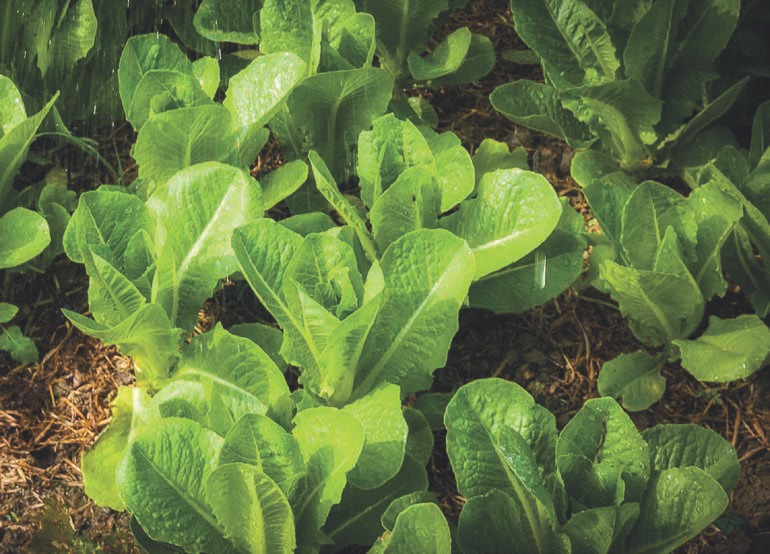
As Tea has helped me simplify my life, teaching me that less is indeed more, She has also helped me to simplify my diet. As I said at the outset of this article, most of the confusion in our diet stems from too much complexity - too many choices. We now have access to food from all over the world and are constantly barraged with data from all fronts that is far too often contradictory. For me, the best approach to a healthy diet has been to radically simplify all this. I eat whole foods. Since we are discussing simplicity, I'll put it simply: If the ingredients look like the kinds of things in my great-grandma's kitchen, that is healthy food and if it reads like a science textbook, I avoid it. Diet really can be that easy!
The complexity, confusion and complication that we face when researching dietary advice also applies to the modern methods of food production. For thousands of years, people produced food on farms and brought it to market, where city-dwellers would buy the produce and take it home to cook. When my father was young, he had relatives in Florida that would bring oranges to them in Ohio for Christmas. Some of his friends had never had an orange, and my father would be king for a day, bringing one to show-and-tell. Nowadays, everything is so confused. The food is still made at farms, but then, instead of going to a market where it is sold, it is taken to a factory and mixed with artificial ingredients. We then build other factories to produce the machinery used in those factories, more factories to make the packaging materials and even more factories to build trucks to carry all this stuff around between factories... This senseless complication of what should be simple also deteriorates the nutritional value of our food.
If we saw what goes on in factories, we wouldn't want such processed food. They don't take simple, whole ingredients and cook with them as you do in your kitchen. They actually don't cook much at all. Food factories aren't filled with chefs, though they may have some on their staff; they are filled with scientists and laboratories. And our health and happiness plays no part in their research, development and production of food products. They are profit-driven to use artificial flavors/ ingredients that are cheaper than natural ones, to preserve food longer and to add sugar, fat and oil to make the food more desirable to us. They care about their profits, not our health. And all too often, this whole process damages the environment as well, which further deteriorates our health and quality of life.
Diet doesn't have to be complicated. Eat whole foods. Cook with ingredients straight from a farm, and one that didn't harm the environment and pollute our ability to create more food and pass on a green, healthy Earth to our descendants. Just like tea, the best food is sustainable, organic and grown in balance with Nature. Also like tea, we could speak of "living food," grown in biodiversity rather than monoculture, grown without agrochemicals and with a healthy relationship between humans and the environment. Simple foods are always the best choice for me. In fact, sometimes the best food is no food.
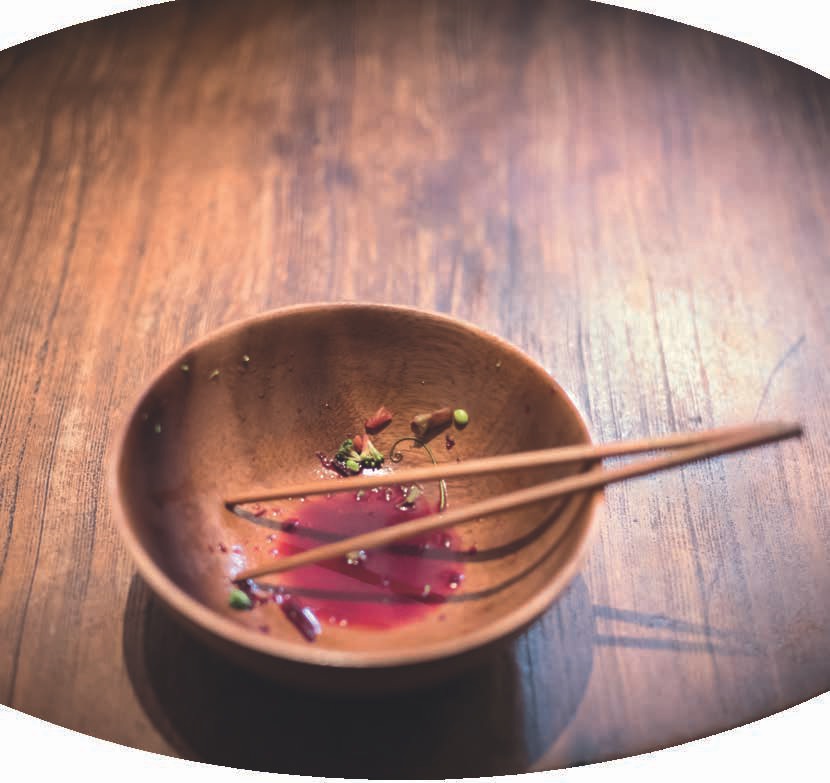
Sometimes I feel like the best question for me is not what to eat, but whether to eat at all. Our ancestors didn't live in such abundance, with food around at all times. Much of our obesity issues stem from our evolutionary makeup: we developed a psychological preference for the rarest foods in Nature, which are fats and sugars, as well as an inherent ability to store these substances for longer since they are so rare - or at least were. When sugar and fat become abundant, and life grew more sedentary, so many of us (myself included) have come to face problems with being overweight, which affects our health, longevity and, worse yet, our quality of life. Without as much food available, there were always periods of fasting during the millions of years that our bodies were evolved. All indigenous people fast.
Eating three times a day at particular times is an invention. It is convenient for social reasons, as you can meet others and eat together, but it has very little health benefits. Also, I have found that eating at a particular time, rather than when my body tells me to eat, further deafens the voice of my body. The messages and wisdom of what I should eat get lost in the schedule of feeling obligated to eat at certain times. When I dropped the idea that I had to eat a certain amount of times a day, or at particular times, my sensitivity to my body and its needs increased.
Most of my problems when it came to being overweight stemmed from not getting enough exercise and overeating. My diet has always been rather simple and based on whole foods, but I had a bad habit of eating too much for my body's needs in any given day. Eating just to eat was a way of ignoring my body and of growing more insensitive to its wisdom. As I began to listen more, I learned to eat less, at the appropriate times and in an amount suited to my lifestyle.
For me, fasting is of incredible value to my health and well-being. I find it important for my physical health and for my spiritual cultivation. Every spiritual tradition on Earth includes fasting as a useful technique for dealing with our attachments to food, for growing lighter and more energetic, and for expanding consciousness. If the body is constantly digesting food, it is more difficult for it to rest and heal itself. For me, I try to never eat in the evening or night, so that my digestive system can rest during the night while I sleep, healing my body and relaxing my mind. On the rare occasions that I do eat dinner, I always notice that my sleep is less deep and my dreams more fitful. This is one of the nonverbal teachings of my body.
I practice fasting the way I do meditation: regular small fasts and annual deep fasts. Similarly, I meditate for shorter periods of an hour or two every day and then sit for longer, deeper retreats once or twice a year. I try to fast every evening, and then for a longer period once a week. Then, I try to schedule a week-long fast at least once a year, sometimes twice. I always feel the effect of this practice as a cleansing of my system. Amazingly, I find that after a couple days, the desire to eat completely leaves me and the fast is no longer a struggle at all. I usually spend a couple days coming off of food and then a couple days at the end of the week of just water to slowly return to eating with smoothies and soups.
There is a lot of research about the benefits of fasting, and even some marvelous results coming from centers that are using fasting to treat incurable diseases. If you are interested in practicing intermittent fasting or fasting for longer periods, you should do some more research and find a way to go about fasting that is conducive to your health and happiness. There may be people with constitutions that make fasting dangerous. I can only speak for myself when I say that fasting is an essential aspect of a healthy diet for me.
The Buddha taught the "Middle Way," which advises us to avoid extremes. The path of Tea has also taught me this, helping me to actualize these teachings in my life. This is something I aim for in my relationship to my diet as well. Since my transformation has come about this year, and is therefore still so fresh, I must admit that I haven't yet found my balance. I still feel the need for enforced discipline surrounding my exercise and eating habits. I still feel the need for an inner drill sergeant that can bully the rest of me into exercising even when I don't want to and to shout above the cravings for unhealthy food. But I don't want to live with this bully forever. I aim to harmonize with my nature.
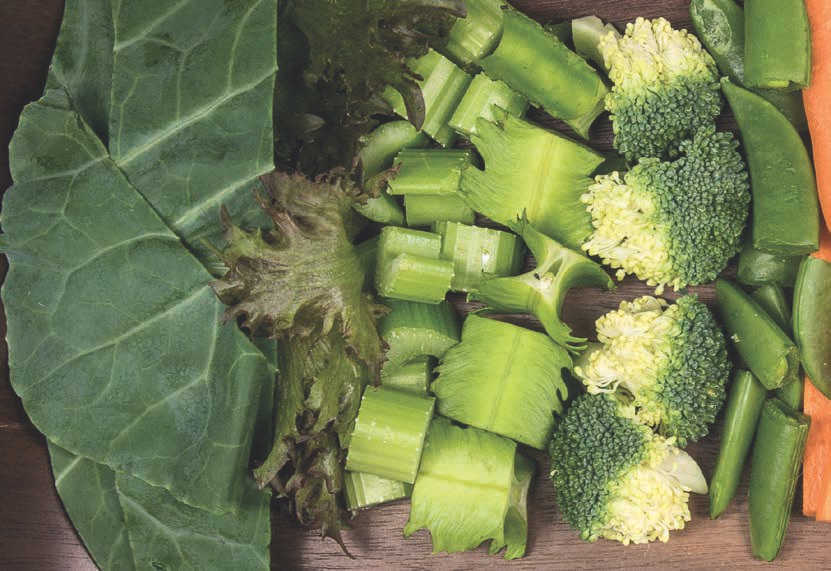
As I have started exercising every day, I have indeed found myself getting closer to a balanced state where I can enjoy exercising some days, loving the act for its own sake, and then be compassionate and let myself take it easy on other days, finding my limitations and respecting them. Similarly, I want to be able to feast with friends and enjoy food for its own sake when the occasion calls for it. Human beings celebrate with food, after all. There is more to eating than just our physical health. Sometimes we need "soul food," as well. Besides a lack of exercise, one of the biggest causes for my being overweight was the fact that I travel so much - often six or seven months a year. And we all know that when we are away, in a new or exciting city, we give ourselves permission to "cheat." Also, everyone wants to take you out to eat and share local, often rich and delicious, dishes with you. Though I was feasting far too often, I don't think it is healthy to be so hyper-focused on health all the time.
Devoting too much energy to our physical well-being is a bit like having a gorgeous antique violin and spending all your time polishing and tuning it without ever playing. We must live. The purpose of having a healthy body is to increase our quality of life and our longevity so we can live more and cultivate ourselves further (in service of others). We must live fully and happily, and being healthy in body is a means to that. In the end, all our bodies will break down and we will die. Finding a balance between eating skillfully, in a way that is conducive to our physical well-being, and also celebrating life and the people we love through delicious meals is my personal ideal. I hope to achieve this by learning to cook special meals with simpler, healthy ingredients, while maintaining a certain extra something that makes such dishes stand apart from our ordinary, daily fare. I also hope to find balance in my food discipline, not letting myself become too loose as to gain weight again, but also not being too tight to enjoy life. As I said, I haven't yet found this balance, though I know it is possible.
Beyond balancing our eating for health and eating for the joy of eating, I think that finding a harmony with Nature is the key to a healthy diet for us as individuals and as a species. The more we develop agriculture based on a philosophy of balance and sustainability, the healthier our world will be. And it is only in a healthy world that we can truly be healthy. You cannot find a healthy organism in an unhealthy environment. If a single cell in our body stops caring about cooperation with the other cells and starts reproducing itself ad hoc, we have the beginnings of cancer. It is no wonder that this is the disease of our age, and one that so many of us will face, since we behave in the same way on the macro level, ignoring the health of the Earth and Nature for our own personal well-being, which, like the crazy cell, is not possible. How can a being whose body is composed of fifty to seventy percent water ever be healthy in an environment where the drinking water is polluted? How can an organism that requires the inhalation of oxygen several times a minute ever be healthy in an environment in which the air is toxic?

To truly be healthy and happy, we have to create a healthy, happy environment, where we can design our cities around sustainable agriculture, green energy and zero pollution. Doing so is a personal matter directly related to my own health, happiness and longevity - perhaps even more so than my dietary choices! Nature is wiser than us, and like our bodies, we must learn to listen to Her, working in cooperation rather than in opposition to Her. If we learn to eat seasonally and harmonize our efforts with the forces of Nature, we can create environments that are conducive to human health and happiness. To achieve this, we will also have to learn to cooperate with one another, understanding that our health and quality of life is dependent upon others. We cannot all be farmers. We need our fellows to make our clothes and food, tea and computers. Together, we can create such a healthy world. It is our selfishness, on the other hand, which has polluted the air and water, Earth and Sky. When we love and serve one another, and our future descendants, realizing that our health is bound to one another, we may indeed have a chance at a clean and healthy Earth.
These are all lessons that I have seen in the bowl. What can I say, other than that tea is the most important part of my diet, as it has not only helped me to be healthier, but has taught me the life wisdom I need to cultivate a healthy relationship with my food, my Mother, the Earth and with you, whom I love.

